|
|
|
Sort Order |
|
|
|
Items / Page
|
|
|
|
|
|
|
| Srl | Item |
| 1 |
ID:
147288


|
|
|
|
|
| Summary/Abstract |
This paper analyses energy relations concerning natural gas between Lithuania and Russia. Contrary to the existing literature, which stresses Lithuanian energy dependence, this paper argues that there had been interdependence between the two countries even before Lithuania underwent diversification at the end of 2014. The paper develops an analytical framework that examines: (a) physical energy relations, (b) the dominance of the energy agenda in mutual relations, and (c) the influence of the European Union. The analysis shows that while Lithuania was dependent on Russian supplies of natural gas, Russia was also dependent on Lithuania as a transit country of gas to Kaliningrad, a Russian enclave. Although Russia has shown a much higher willingness to employ an energy weapon than Lithuania, its efforts to exercise pressure on Lithuania have been negatively affected by the Baltic state’s position as a transit country. The European Union has played a crucial role as its pre-accession requirements and internal energy market rules have significantly influenced the energy relationship between the two countries.
|
|
|
|
|
|
|
|
|
|
|
|
|
|
|
|
| 2 |
ID:
147289
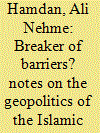

|
|
|
|
|
| Summary/Abstract |
In the last two years, the so-called “Islamic State in Iraq and Sham” has transformed the Syrian Civil War, effecting serious confrontations in Iraq and Lebanon, dismantling security regimes along the Iraq-Syria border, and causing the mass exodus of ethno-religious communities across the region. These dramatic events are often interpreted through the official rhetoric of the group itself, which draws on discourses of the “Sykes-Picot” conspiracy and narratives of returning to Islamic principles. Tempting though it is to deconstruct such rhetoric on its own, efforts in this direction have over-emphasised its Islamic and territorial elements to the detriment of a deeper understanding of the locally varying, strategic nature of ISIS’s activities in the Middle East. Accordingly, this paper considers how local interests articulate with ISIS’s transnational movement, looking at their activities along the border region of Syria, Iraq, and Turkey. It begins with a discourse analysis of one important narrative in early analysis of ISIS’s “border-breaking” rhetoric, the narrative of Sykes-Picot, before laying out how geographers have engaged with the geopolitics of radical Islamist militant groups more generally. Then drawing on a combination of secondary sources and ethnographic fieldwork in Turkey and Jordan, it elaborates how the politics of place shapes ISIS’s political practice, using the example of the Syrian-Iraqi borderland (the Jazirah). In doing so, I hope to emphasise the relative importance of historical-geographic context over discourse and narrative for understanding the actions of ISIS.
|
|
|
|
|
|
|
|
|
|
|
|
|
|
|
|
| 3 |
ID:
147285


|
|
|
|
|
| Summary/Abstract |
All over Europe, EGTCs (European Grouping for Territorial Cooperation) are mushrooming. Between 2006, when the EU regulation entered into force, and 2014, 51 EGTCs have been established. Conceived as a legal tool to facilitate cross-border, interregional or transnational cooperation, the EGTC was established after years of lobbying from cross-border organisations. Apart from practical guidelines mostly dedicated to the legal possibilities and limitations of this tool, few academic studies examine the significance of this tool for cross-border governance as such. This paper develops such a perspective, using the case study of the Greater Region SaarLorLux, (Lorraine, Luxembourg, Rhineland-Palatinate, Saarland and Wallonia), where two existing EGTCs are operating. The EGTC INTERREG IV A Greater Region is the only EGTC managing an EU programme; the EGTC Secretariat of the Summit supports the main political organisation in this area. This contribution argues that the EGTC tool can facilitate the emergence of a supraregional scale of governance. This paper examines how this instrument allows the institutionalisation of a cross-border entity in terms of its capacity to embody and perpetuate the cross-border region, and to implement its strategy. It then applies this conceptualisation to the specific context of the Greater Region. The empirical analysis shows that although the two EGTCs institutionalise the cooperation, they are rather conceived as administrative and operational tools. The paper concludes with possible explanations of such a mismatch between the potential of this tool and the effective use of it.
|
|
|
|
|
|
|
|
|
|
|
|
|
|
|
|
| 4 |
ID:
147291
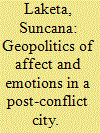

|
|
|
|
|
| Summary/Abstract |
This paper aims to advance our knowledge of the relationships between emotions, affect, and geopolitics. For, among several criticisms of affect’s non-representational theories, is the claim that it has not been used to understand problems of real social and political importance. What is crucially lacking in this important body of work on the nexus between affect and politics is empirically grounded research that examines these processes, especially in situations of geopolitical instability and conflict. In this paper, I seek to address this gap by attending to the geopolitical role of feelings in the volatile political climate of a post-conflict city. Specifically, my work examines the emotional and affective landscapes of daily life in the city of Mostar in Bosnia and Herzegovina which, twenty years after the war officially ended, continues to experience divisions between its Croat/Catholic and Bosniak/Muslim populations.
|
|
|
|
|
|
|
|
|
|
|
|
|
|
|
|
| 5 |
ID:
147290
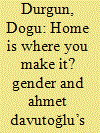

|
|
|
|
|
| Summary/Abstract |
The Justice and Development Party’s (AKP) policymakers have aimed to position Turkey as the leader of the Middle East by assessing its soft power since they came to power. Drawing on Strategic Depth of Ahmet Davutoğlu, Prime Minister of Turkey, this article attempts to offer a critical constructivist, postcolonial and feminist analysis of Turkey’s recent foreign policy discourse in the region by showing how the myth of leadership is constitutive, and is constituted by Davutoğlu’s discourses on women/femininities and men/masculinities. The leadership is imagined by localising Enlightenment notions of masculinity through a re-reading of local traditions, namely Ottoman history and Islam. In doing so, Strategic Depth aims to feminise Turkey’s imagery without necessarily putting it out of the masculinity continuum. As such, Turkey mimics the West but differs from it so as to perpetuate a good masculinity over the people of the Middle East. Implicit in such an imagery, the text distinguishes itself from the competing self-perceptions (and masculinities) in the country, namely the Kemalist one. I further argue that this imagery underlies the recent hypermasculinisation of politics within and beyond the country when political elites feel threatened in the face of political crises.
|
|
|
|
|
|
|
|
|
|
|
|
|
|
|
|
| 6 |
ID:
147283
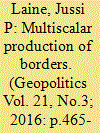

|
|
|
|
|
| Summary/Abstract |
The present geopolitical situation has made the debate on borders and their functions, significance, and symbolism more prominent than at any time since the end of the Cold War. While the various processes of globalisation have challenged the traditional border concept, the scalar model of identity and society remains primarily anchored in national space. The understanding of the state as a multiscalar construction, constantly negotiated and reconfigured by its actors at different levels, allows us to broaden the scope of our analysis and rethink and transform the spatial formations previously taken for granted in assessing the impacts of globalisation more regionally. State borders continue to have considerable relevance today, yet as the articles brought together in this special section will demonstrate, borders must be understood as complex, multiscalar, multidimensional, yet dynamic entities that have different symbolic and material forms, functions, and locations. With examples from Europe, Southeast Asia and the global south, this section aims to advance our knowledge of the multiscalar dynamics of border politics.
|
|
|
|
|
|
|
|
|
|
|
|
|
|
|
|
| 7 |
ID:
147293


|
|
|
|
|
| Summary/Abstract |
This article discusses changes in the discourse and practice of the EU external border. Findings of a small-scale research project looking at UNHCR’S Border Management and Protection of Refugees (BMPR) programme will discuss developments taking place at the EU external border and will show a new kind of narrative. Institutional cooperation, access to territory and compliance with the principle of non-refoulement seem to have improved. A more empathetic narrative of border security has found its way into institutions of enforcement authorities that primarily follow their mandate of protecting the state’s border and territory. This new narrative is, however, highly politicised and institutionally driven. By taking a more critical view, I introduce the concept of humane refoulement towards the end of the article describing the consequences of this new narrative and denoting it as hypocritical in its nature.
|
|
|
|
|
|
|
|
|
|
|
|
|
|
|
|
| 8 |
ID:
147284
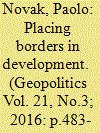

|
|
|
|
|
| Summary/Abstract |
Development is inextricably related to the state-centred cartography of world spaces defined by borders, both in its historical trajectory and contemporary entanglements. Yet the multiplicity of channels and directions characterising their articulation are scarcely explored. This article contributes to this emerging field of enquiry. It delineates the essential traits of the borders and development nexus by establishing a systematic dialogue between the fields of Border Studies and Development Studies, a dialogue framed by concerns with scalar politics. More specifically, the paper places borders in development in two ways. First, it places borders in Development Studies: it identifies borders as a useful analytical vantage point that lay at the intersection between state- and non-state centred geographies of development. Second, it places Border Studies in development: focusing on the tension between borders and bordering processes, it interrogates economic growth- and poverty-related policies. Three contributions to the study of development arising from placing borders in development in this way are highlighted. The paper also expands the emerging field of enquiry concerned with the relation between borders and development, by considering development policies not yet been examined through the prism of borders, and by emphasising the hierarchical and yet unpredictable nature of the borders and development articulation. At its broadest, the discussion dis-entangles the multiplicity of scales and directions in which borders, bordering and the development process intersect. It is at this scalar intersection that the force of development, and the potentials for engaging, opposing, avoiding, or subverting it, lay.
|
|
|
|
|
|
|
|
|
|
|
|
|
|
|
|
| 9 |
ID:
147286


|
|
|
|
|
| Summary/Abstract |
After Poland’s accession to the EU, the Polish-Russian border became the EU external border. This significantly changed its nature and started the new type of cross border relation. Since 2012, when the Small Border Traffic (SBT) zone came into force, the border has changed its blockade function and started instead to be treated as a resource. The fundamental loosening of the border crossing regime reduced the social and functional distance between Poland and Kaliningrad, and in a broader sense between EU and Kaliningrad. This paper will try to show how small but meaningful initiative, the SBT, has had an impact on cross-border region. The present paper will describe the relationship between larger geopolitical actors and how they affect local border relations. The aim of this paper is to present phenomenon of new visa regime at the Polish-Russian border. The paper likewise describes the impact of the SBT on local communities and their economies, as well as national relations between adjacent countries. The analysis is based on the interviews and surveys conducted in the Polish-Russian border region in late 2014.
|
|
|
|
|
|
|
|
|
|
|
|
|
|
|
|
| 10 |
ID:
147292


|
|
|
|
|
| Summary/Abstract |
In recent years there has been growing recognition of the militarisation of US foreign policy in Africa, especially following the establishment of a dedicated, regional combatant command (Africa Command, or AFRICOM) in 2007. At the same time knowledge of the extent and aims of US military activities in Africa remains murky, especially when compared to other regions such as the Middle East and Europe. This article begins by conceptualising AFRICOM as a geopolitical assemblage, an approach we believe useful for analysing its composition and emergence. Next we discuss the challenges involved in tracing the US military’s evolving presence in Africa and the methods utilised in our analysis. Following this we present three case studies: the first compares the composition and geographies of manned and unmanned aerial surveillance assemblages, the second details logistics infrastructures and the military’s use of contractors to develop logistical capabilities across the continent, the third examines growing counterterrorism entanglements in West Africa. We conclude with some observations concerning the divergence between purported aims and the focus and outcomes of the US military’s presence in Africa.
|
|
|
|
|
|
|
|
|
|
|
|
|
|
|
|
| 11 |
ID:
147287


|
|
|
|
|
| Summary/Abstract |
Transboundary flows of energy across Yunnan Province in China and to Southeast Asian states provide insight into the changing nature of borders and border areas. Rather than monolithic symbols of state sovereignty, China’s southwest borders in Yunnan can be more accurately characterised as zones of connectivity and exchange, serving a range of local, national and regional objectives. Energy production and distribution in and across Yunnan can be understood as functioning in a set of dynamic transnational processes that serve as economic and political bridges – increasing interaction and deepening regional integration – while also working to mitigate risk to China’s energy demands. In this article, energy projects in Yunnan and Southeast Asia demonstrate the ways border regions can respond to increasing globalisation, simultaneously strengthening national energy security while promoting regional interconnection and diplomacy. Thus, connections to and through a once peripheral region present an apparent contradiction: once rigid territorial borders are increasingly characterised by transboundary infrastructure development and exchanges of energy, capital and diplomacy, while promoting broader, diversified national energy security objectives – essentially strengthening national security through transnational energy projects. This article investigates how energy development works to shape Yunnan’s role as an “energy conduit,” while advancing both transnational and national geopolitical objectives, and thus, suggesting that these projects can be understood as trans-political in nature.
|
|
|
|
|
|
|
|
|
|
|
|
|
|
|
|
|
|
|
|
|